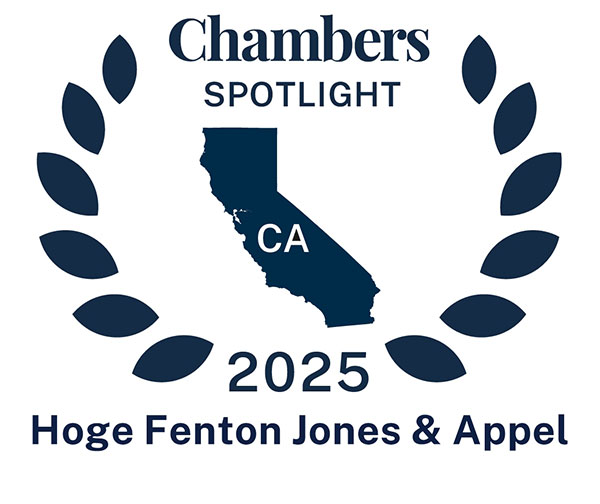Division of Businesses During Divorce: What You Need to Know
By Hoge Fenton | 07.1.2020 | Client Alerts

The most valuable asset in a divorce is often the community property business. Decisions regarding the business are often complicated by third party interests. Other owners, employees, the business owners and their family all have stakes in ensuring that the business is handled correctly during a divorce. Unfortunately, without proper guidance businesses are often not handled properly, adversely affecting everyone involved.
This article discusses various strategies for dividing businesses during divorce.
When business division is involved, divorce lawyers, business lawyers, and tax lawyers are often required due to the complexity. For example, engaging a business attorney early in the process can help issue spot during Due Diligence and subsequent phases. They can review company documents, voting rights and privileges, creditors, and disclosures for potential issues. They can determine if a non-compete agreement is needed and help with key terms of the division, security of business interests, and structuring a tax efficient approach.
There are three ways to divide businesses:
- Buy-Out of One Spouse by the Other: This option is usually preferred, but not always possible. It requires a business valuation, which is usually a hotly contested topic in divorce as one spouse (the seller) usually wants the highest possible valuation and the other spouse (the buyer) usually wants the lowest possible valuation. In addition, the buyer must have access to the funds needed to execute the buy-out.
- Sale to a 3rd Party: This option occurs when both spouses sell their business ownership interests to a 3rd party. This requires a buyer who is willing to pay an acceptable price to the spouses. Often times, buyers are only willing to pay prices that are too low to be acceptable to the spouses.
- If a Buy-Out or Sale is not possible, particularly in time of economic crisis, the alternative option is Co-Ownership. This option can be challenging, complex, and risky.
Co-Ownership: The Complex Default Option
Co-Ownership involves both spouses maintaining an interest in the business. This is usually a temporary arrangement until a buy-out or sale can be arranged or the financial crises ends. These arrangements are often complex. Key items in a co-ownership agreement include:
- Option to Purchase a Spouse’s interest in the business
- Rights to Financial Benefits (Economic rights): Financial payouts are typically proportional to ownership percentage, and profit distributions follow equity percentage.
- Management and control: Management and control of the business is typically given to one spouse who acts as the manager.
An In-Kind Approach to Co-Ownership creates a subordinate class of equity for the non-operating spouse. This new class of equity has reduced voting and management rights. Thus the spouse can still reap the financial benefits but does not have management or control over the business. Although appropriate for many small businesses, larger businesses will have other 3 rd party owners who may object and complex ownership structures that may limit what can be done.
In some cases, a Holding Company may be more appropriate. In this scenario, a holding company is created to jointly hold the spouses interests. This limits the changes needed by the rest of the ownership, as the holding company essentially replaces the spouses interests with no further changes. That being said, a key challenge of the holding company approach is the selection of entity for the holding company: Limited Partnership, Limited Liability Corporation (LLC), C-Corporation (C-Corp), S-Corporation (S-Corp), or Trust. The selection of the entity is complex because the entity of the operating company limits the entity options of the holding company. For example, if the operating company is a Limited Partnership, the holding company cannot be a partnership or C-Corp. Instead, it must be an LLC, S-Corp or Trust.
Professional Corporations
Co-Ownership of Professional Corporations (e.g. medical practice, law firm) is challenging because state law limits who can be owners. One approach is to have the operator spouse (e.g. the doctor operating the practice) to continue to hold the interest of both spouses, with accountability to distribute the income appropriately. Understandably, the non-operating spouse may be reluctant to accept this approach.
In addition, this approach introduces bankruptcy risk: because the operating spouse holds title, there is a risk that the spouse’s creditors can attach the entire interest in the event of bankruptcy. The only way to avoid this risk is to divide the interest and confirm the divided interests as each spouse’s separate property, but that may not be allowed by the professional corporation.
Collection Account Management
Finally, another approach is Collection Account Management (CAM). CAM is an escrow, used in the entertainment industry. In a CAM, payments (e.g. royalties) are sent directly to a neutral party. The neutral party then distributes payments per their instructions.
An Integrated Approach to Division of Businesses During Divorce
At Hoge Fenton, we take a holistic approach to advising our clients through the divorce process that include family law, corporate law, tax, and estate and trust. Our lawyers work closely together, and our family law attorneys can quickly and cost-effectively get business, tax, and even estate planning counsel as needed. This results in better outcomes for our clients during the most important legal situations of their lives.
 |
 |
|
Shareholder
Certified Family Law Specialist
D: +1.408.947.2468
|
Chair, Family Law
Certified Family Law Specialist
D:+1.408.947.2408
|
This information is provided as an educational service by Hoge Fenton for clients & friends of the firm. This communique is an overview only, & should not be construed as legal advice or advice to take any specific action. Please be sure to consult a knowledgeable professional with assistance with your particular legal issue. © 2020 Hoge Fenton











